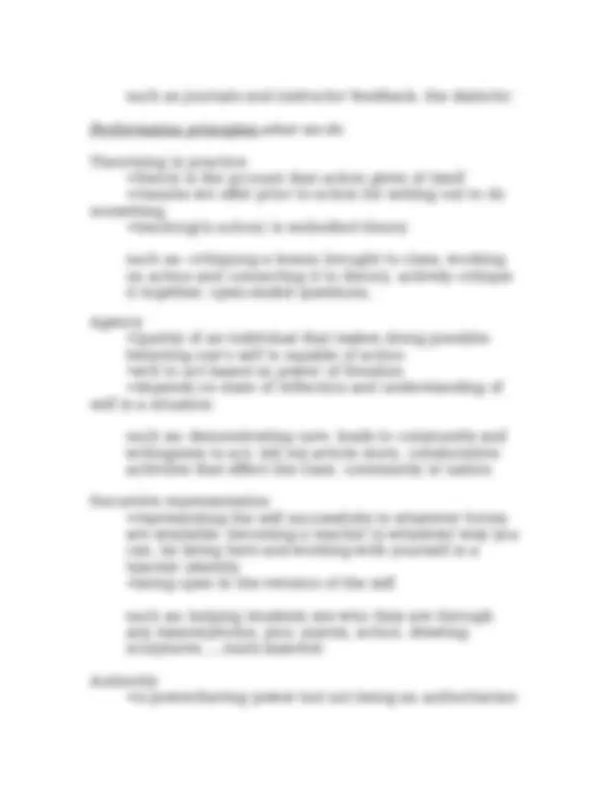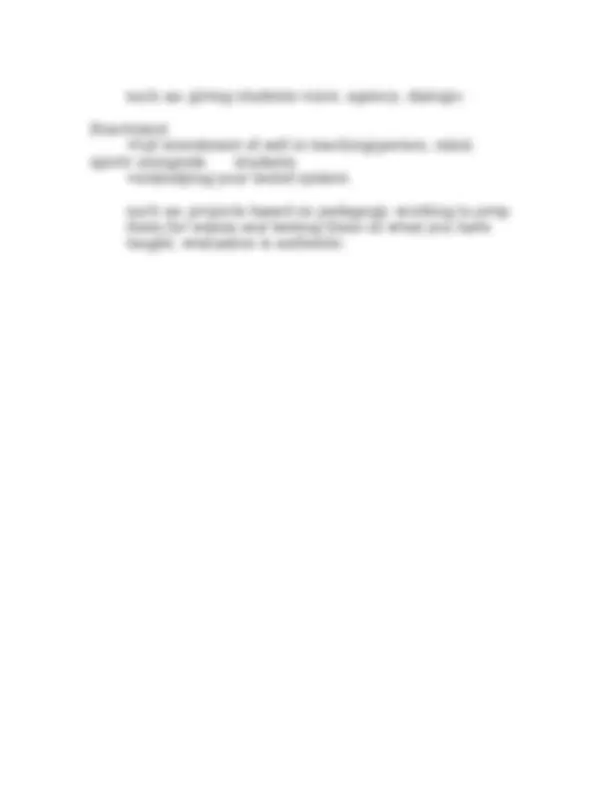




Study with the several resources on Docsity

Earn points by helping other students or get them with a premium plan


Prepare for your exams
Study with the several resources on Docsity

Earn points to download
Earn points by helping other students or get them with a premium plan
Community
Ask the community for help and clear up your study doubts
Discover the best universities in your country according to Docsity users
Free resources
Download our free guides on studying techniques, anxiety management strategies, and thesis advice from Docsity tutors
Danielewicz's 10 principles of pedagogy, emphasizing reflexive practice, discourse richness, dialogue and dialogic curriculum, collaboration, deliberation, reflexivity, theorizing in practice, agency, recursive representation, and authority. These principles encourage student-centered, open, and collaborative learning experiences.
Typology: Study notes
1 / 4

This page cannot be seen from the preview
Don't miss anything!



Danielewicz and 10 principles of Pedagogy Dr. Miller, Engl 681 Danielewicz, J. (2001). Teaching selves. New York: State University of New York. Pedagogy is: Process of structuring of activities, interactions, events and assignments in teaching according to the ideas that are congruent with or grow out of particular theories- Danielewicz Reflexive practice- Salvatori Teachers must be open to the possibility that sometimes their pedagogy is not congruent with the needs of their students, may be counterproductive or ineffectual. Structural principles- how things are arranged Discourse richness and openness •discourse constitutes self and experience- through discourse, acts of language that communicate and connect with others we help each other shape our identities (reciprocity) •discourse is universally productive , creating selves and reality •should be student-centered, student-selected and not dictated like discussion, interviews, soc Dialogue and dialogic curriculum •weaves together language and social interaction •consists if utterance and answer (Bakhtin)- we speak in order to be answered-meaning is created where two or more voices contact-each utterance is incomplete until it is answered •generates knowledge or understanding, and constitutes the “other”, shared meaning arises •open structure
like letter writing, exchanges Collaboration •joint effort, shared goals, collective responsibility, commonly held social values •work together in small peer groups to accomplish tasks set by teacher (works best when it is carefully planned and structured) •outcome can be exciting and unpredictable such as learning centers-working together Deliberation •according to John Dewey, a process by which “we give way, in our mind, to some impulse; in our mind, some plan.” •dramatic and active •Dewey says that for learning have consequence, the intuitive, direct and personal must be activated such as simulating real teaching experiences, centers- working together Reflexivity •act of self-conscious consideration •thinking that turns back on itself-a reexamination or revisiting of a project or activity, a questioning of motives, frameworks, assumption, working strategies, conclusions, beliefs and actions •an intentional means to an end-active analysis of past situations, events, products, with the inherent goal of critique and revision for the explicit purpose of achieving an understanding that can lead to change in thought or behavior •enables us to reinvent ourselves; in this process, take into account new ideas or experiences
such as: giving students voice, agency, dialogic Enactment •full investment of self in teaching(person, mind, spirit) alongside students •embodying your belief system such as: projects based on pedagogy, working to prep them for exams and testing them on what you have taught, evaluation is authentic